What’s in a week? For me, usually that means a lot of meetings and I want to know what’s going to happen! That’s the point of this regular newsletter in a nutshell. Sometimes there are patterns and commonalities between the meetings and I hope you’ll share what you see. This week, I’m going to get directly to some highlights:
- Charlottesville City Council will officially cancel a streetscape project that was intended to support increased pedestrian and bike activity on West Main Street
- Fluvanna County’s Planning Commission will consider a plan to demolish a retired fossil fuel factory on the James River
- Nelson County and the Department of Environmental Quality will review a request to renew a permit that allows the application of sewage sludge as fertilizer
- The Crozet Community Advisory Committee will get a lesson on water protection rules in Albemarle and capital projects for drinking water and sewer
- The Charlottesville Tree Commission will learn about “biophilic cities” and review a project to restore a waterway that runs through McIntire Park
- The Albemarle Conservation Easement Authority will be asked to consider allowing a structure on a rural property that is well over the limits agreed upon when an easement was adopted
- The Louisa County Board of Supervisors will consider formal opposition to any change to the name of the regional library system
As always, thanks to the Piedmont Environmental Council for their ongoing support of this program. Check out their website to see what’s happening in their 50th anniversary year.
There are over 235,000 people who live in area covered by this newsletter. Help grow the audience by sharing it with people you know!
Monday, June 6, 2022
Charlottesville City Council to officially cancel West Main Streetscape project, renew contract for city manager services
There are a lot of transportation components to Charlottesville City Council’s meeting which has two segments. The work session begins in City Council Chambers at 4 p.m. and the regular session happens at 6:30 p.m. (meeting info)
At the work session, the five Council members will be presented with the current draft of the Regional Transit Vision plan that’s being crafted by consultants hired by the Thomas Jefferson Planning District Commission. Two of the Councilors got the briefing when the Regional Transit Partnership got their briefing in May. (read my story)
The work entails imagining how the overall transit system might look if there was funding available through revenues that might flow through a regional authority. The consultants AECOM and Jarret Walker + Associates estimate that could bring in $26 million. They also produced a vision for what $70 million could bring.
“While the vision plan document has not yet been finalized, the consulting team for the study has started to identify community priorities and sketch out broad goals and recommendations,” reads the staff report written by Lucinda Shannon, a senior regional planner with the TJPDC.
The Albemarle Board of Supervisors got their look on June 1, and I’ll have a write-up on that discussion in a future installment of Charlottesville Community Engagement. Details about those revenues will likely not come until a separate governance study is conducted. Currently, the city of Charlottesville owns and operates Charlottesville Area Transit. A previous attempt to create a regional transit authority fizzled in the late 2000’s, and the partnership was set up to try to find ways to share ideas and increase cooperation.
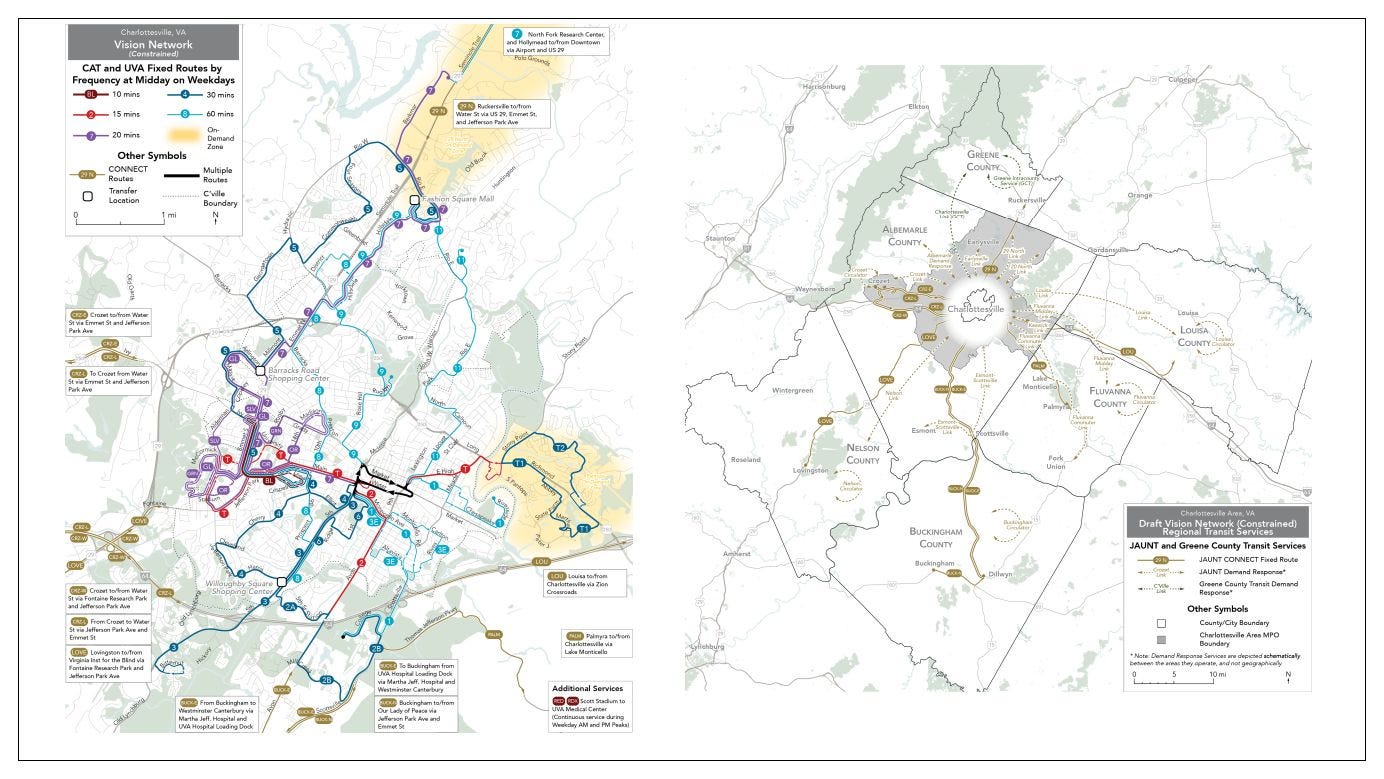
Next, Council will get an update from the Charlottesville Albemarle Convention and Visitors Bureau. That organization’s mission is to bring more tourists to the area from across the country. The presentation serves as an introduction to the organization to Council. They are funded by a portion of the transient lodging in both jurisdictions and the city contributed $946,848 to the county’s $606,281 in the FY22 budget. The presentation will detail how that money has been spent and what future initiatives are in the works.
One of these is the Discover Black Cville campaign which began in late March and is running throughout the country. There’s a digital passport that lists more than 20 Black-owned attractions and businesses which sends people to the Jefferson School to receive a prize, according to the presentation.
The report also notes that hotel occupancy was up to around 75 percent in April, slightly higher than in April of 2021. Hotel occupancy was under 25 percent in the first month after the pandemic began.

In the evening session, there’s a public hearing and first of two readings on the utility rates for FY23 for water, wastewater, natural gas, and stormwater.
“Thoughtful, deliberate planning and sufficient financial resources ensure efficient and orderly maintenance and operation of these systems,” reads the staff report. “This need for investment in our utility systems is not without cost, but our utility rates must also be balanced with the need for continued affordability for our customers.”
Rates for water and sewer are increasing because the Rivanna Water and Sewer Authority has raised its rates for both the city and the Albemarle County Service Authority. In turn, the city is increasing rates for water and sewer, but is decreasing rates for natural gas. The city is also raising the connection fees for multifamily buildings.

Next, there’s a public hearing on the city’s resolution to grant an extension to the existence of the Rivanna Water and Sewer Authority. The RWSA was created fifty years ago and needs both the city and Albemarle County to authorize another half-century. (staff report)
One side note, the consent agenda has an agreement for who will pay the capital costs for expansion of four water projects to expand capacity in Albemarle’s northern growth area. The ACSA will pay the full debt service for three of these, but the city will pay 10 percent of the cost of a future water storage tank to serve the Airport Road Water Pump Station. (staff report)
After the RWSA public hearing, there’s a first reading of an agreement of a new service agreement between the city and the Albemarle Charlottesville Regional Jail. The agreement was originally adopted in November 1995 and the document has been updated with several new terms, such as “per-diem rate.” (staff report)
The final action item is a resolution that states clearly all of the changes staff seek to make to current transportation projects. These were discussed at a May 24, 2022 work session and my summary goes into more detail, but here’s a summary:
- The Virginia Department of Transportation will take over administration of a project to extend the eastbound Route 250 Bypass left turn lane onto Hydraulic Road
- A distinct project to add pedestrian improvements at Monticello Avenue and Ridge Street will be canceled and that function will be developed as part of a Smart Scale project with the title 5th Street SW Corridor Improvements
- Signal coordination on Emmet Street will be canceled
- The entire $55 million West Main Streetscape will be canceled and funding will be returned to VDOT for redistribution
- The Preston/Grady Avenue Smart Scale project funded in Round 4 will be canceled
On the consent agenda:
- The Board of Architectural Review and the Planning Commission would formally be authorized to hold hybrid meetings (staff report)
- The city’s contract with the Robert Bobb Group will be extended to December 31, 2022 and interim City Manager Michael C. Rogers is authorized to hire a police chief (staff report)
Louisa County Board of Supervisors to get update on broadband, opposition of JMRL name change
There’s a lot of business on the agenda of the Louisa County Board of Supervisors meeting that begins in open session at 6 p.m. at the Louisa County Public Meeting Room. (agenda)
I’ll start with something on the consent agenda. The Louisa County Community Development Department has experienced a significant uptick in activity in recent years. For instance, building inspections have increased 139 percent in the past three years. Staff are recommending the Planning Commission take a look at fees in order to find more resources to hire more staff.

Next, there are updates from the Firefly Fiber project, VDOT, and the Louisa County Water Authority, as well a discussion on a proposal to waive landfill tipping fees. There’s also discussion about this November’s proposed referendum on a $16.5 million bond issue to cover the costs of four baseball fields, four rectangular fields, a field house for the Louisa County High School football team, and other amenities. (page 41)
Under action items, there is a resolution to oppose any name change to the Jefferson Madison Regional Library, which was formed in 1972. A group of descendants of enslaved laborers asked for the change at the JMRL Board of Trustees meeting in late May.
“According to information on Jefferson-Madison Regional Library’s website, public libraries in Central Virginia have a rich heritage derived from the private libraries of leading forefathers – Thomas Jefferson, James Madison, and James Monroe, who each had extensive personal libraries,” reads the resolution. (page 54)
“The Louisa County Board of Supervisors are opposed to any proposed name changes of the Jefferson-Madison Regional Library,” the resolution continues.
David Holtzman writes in The Central Virginian that Board Chairman Duane Adams is behind the resolution, but Tammy Purcell notes the resolution does not include language about defunding JMRL.
In other meetings:
- The Albemarle Architectural Review Board meets virtually at 1 p.m. On the agenda is a discussion about the Entrance Corridor Review Guidelines for 250 West from Afton to Ivy Road. According to the materials, Route 250 follows the alignment of a former Route 39. (meeting info)
Tuesday, June 7, 2022
Charlottesville Tree Commission to get presentation from UVA professor
The Charlottesville Tree Commission meets at 5 p.m. for an electronic meeting. (meeting info)
Tim Beatley is the Teresa Heinz Professor of Sustainable Communities in the Department of Urban and Environmental Planning at the University of Virginia School of Architecture. He’s also the author of the 2011 book Biophilic Cities: Integrating Nature into Urban Design and Planning. Beatley will present to the Tree Commission an item entitled “Innovative Tree Conservation in Cities: Lessons from the Biophilic Cities Network.
After that, Dan Frisbee will give an update on the restoration of Schenks Branch, a project the city is undertaking with the Botanical Garden of the Piedmont and the Virginia Department of Environmental Quality. The project is funded through the DEQ’s Stormwater Local Assistance Fund (SLAF) grant program. The firm Hazen & Sawyer conducted an analysis of existing conditions and have a plan to restore 900 linear feet of the project in eastern McIntire Park.
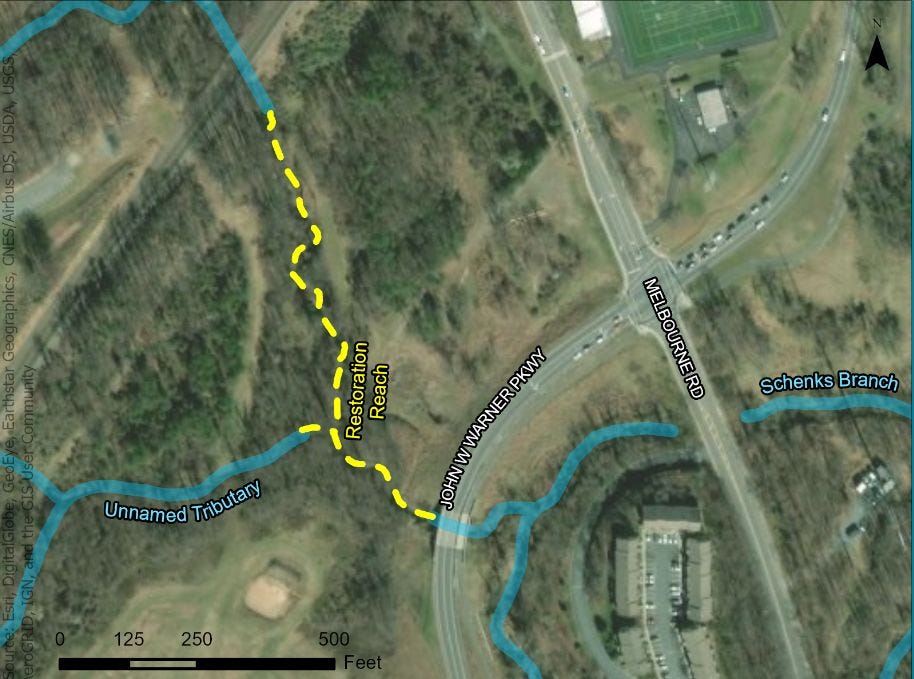
Fluvanna County Planning Commission to review Bremo Power Station demolition
The Fluvanna Planning Commission has a full meeting that begins at 7 p.m. in the Fluvanna County Library in Palmyra. They’ll see several presentations on land use matters from Community Development Director Douglas Miles and consider a couple of site development plans. (meeting info)
In the first plan, Dominion Energy seeks permission to demolish a portion of the Bremo Power Station. The coal-fired station went into operation in 1931 and two of the units were converted to natural gas production in 2014. These were retired in 2019.
“Dominion Energy has been proceeding with the removal of the Bremo Power Station with the Asbestos removal, removal of interior materials and the demolition of the Administration Building during the end of 2021 and into early 2022,” reads the staff report. “They plan to demolish the Turbine Units building and the demolition of the power station stacks during the Summer of 2022.”
In the second, they will review a sketch plan for a 52,500 square foot warehouse to be built on undeveloped land at the intersection of Route 250 and Edgecomb Road in the Zion Crossroads Community Planning Area. The property was rezoned last July. Perkins & Orrison are also seeking a sidewalk waiver along U.S. 250 and VDOT has indicated their support. A contract purchaser is acquiring the parcel from the Covenant Church of God of Albemarle.
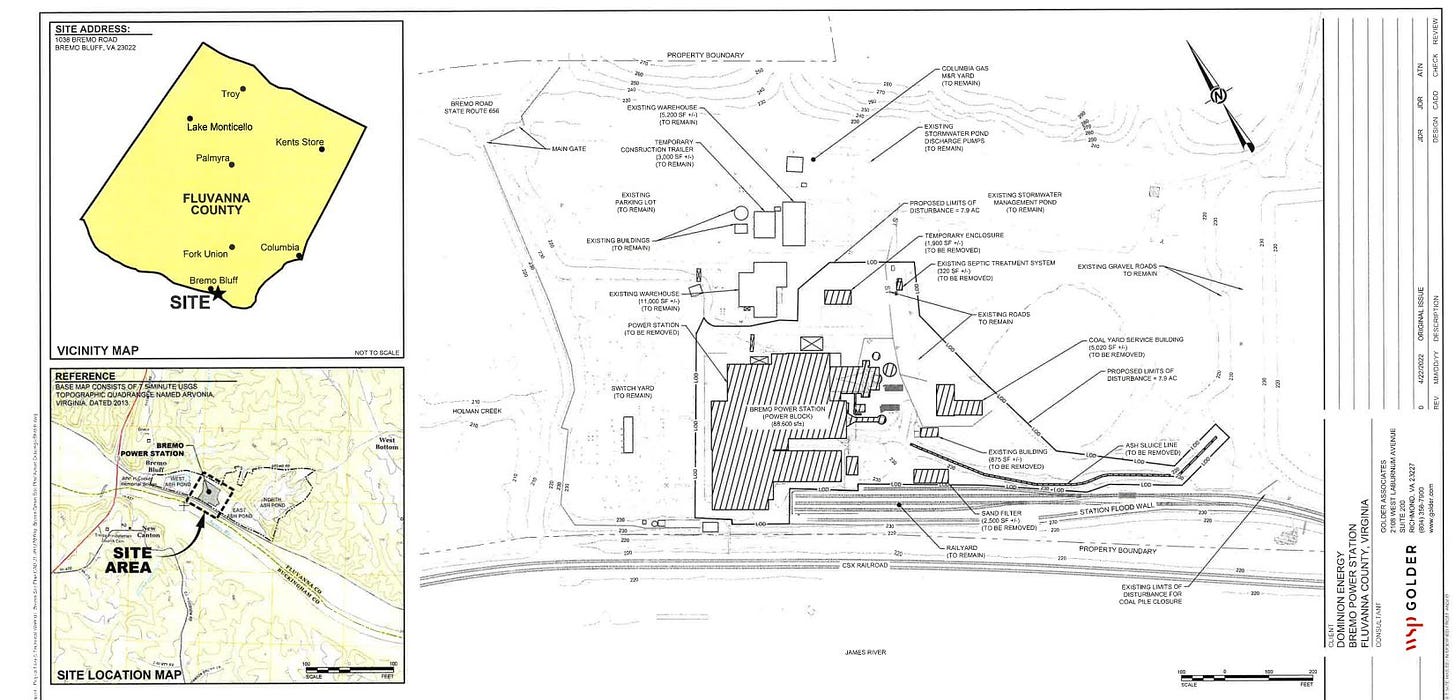
Nelson County hosting meeting on sludge permit renewal
The Virginia Department of Environmental Quality is holding a meeting on the reissuance of a permit for Synagro to apply biosolids on over 2,400 acres of land.
“The permit authorizes the land application of biosolids and water treatment plant (WTP) residuals as fertilizer to specific sites in Nelson County, and limits the application of nutrients, metals, and pathogens contained in these materials to amounts that protect water quality and human health, in accordance with the VPA Permit Regulation, 9VAC25-32,” reads the permit notice on the DEQ website.
This permit renewal also asks for an additional 937.4 acres to be added, for a total of 2,448.3 acres of agricultural and silvicultural land. The meeting will be held at 6 p.m. in the Nelson County Courthouse in Lovingston.
Biosolids are also known as sewage sludge, according to the U.S. Environmental Protection Agency.

Wednesday, June 8, 2022
Crozet CAC to get briefings on RWSA projects, Albemarle’s water protection ordinance
There’s a new chair of the Crozet Community Advisory Committee as profiled recently in the Crozet Gazette. Such committees can be a platform for community members to learn more about land use and development rules. That’s certainly the case in this month’s meeting which will take place virtually at 7 p.m. (meeting info)
First, the chief engineer of the Rivanna Water and Sewer Authority will give a presentation on various water and sewer projects for Crozet. The RWSA operates a separate urban water supply for Crozet and there are various upgrades underway at the moment.
Next, county engineer Frank Pohl will provide an update on the Albemarle Water Protection ordinance. That was first updated in 1998 to help reduce the amount of sediment that makes it way into the watershed. Learn more on the county’s website.
In other meetings:
- The James River Water Authority will meet at the Fluvanna County Public Library at 9 a.m. On the agenda are updates on the planning for a water line between the James River and Zion Crossroads. (agenda)
- The Charlottesville Human Rights Commission has a virtual meeting that takes place from 4 p.m. to 7 p.m. There’s no agenda at publication time. (meeting info)
Thursday, June 9, 2022
Online hearing for the North 29 Corridor study
(this is a reprint of what ran last week as the meeting was postponed from June 2 to today)
The Thomas Jefferson Planning District Commission and the Virginia Department of Transportation have been working on a study of the U.S. 29 corridor between Airport Road in Albemarle County and Deerfield Drive. A public meeting was held in-person on May 19 for community members to review concepts for improving six intersections along the way.
However, Greene County Supervisor Davis Lamb asked for another meeting in a May 20 email to VDOT.
“I feel that VDOT either is slow or so busy that they only send out their email the day before the actual virtual meeting is to take place,” Lamb wrote. “Please remember that citizens have other jobs and meetings that require their time, so they need advance notice.”
The virtual meeting will be held from 7 p.m. to 9 p.m. via Zoom. (register)
Albemarle panel to review to break easement rules for larger structure
The Albemarle Conservation Easement Authority will meet virtually at 4:45 p.m. On the agenda is a request to allow a building on Stony Point Pass that is larger than allowed under the easement held by the ACEA. That contractual document allows one main building of no more than 7,000 square feet but the owners seek to build an 11,500 square foot structure. There are already two other buildings on the lot. (meeting info)
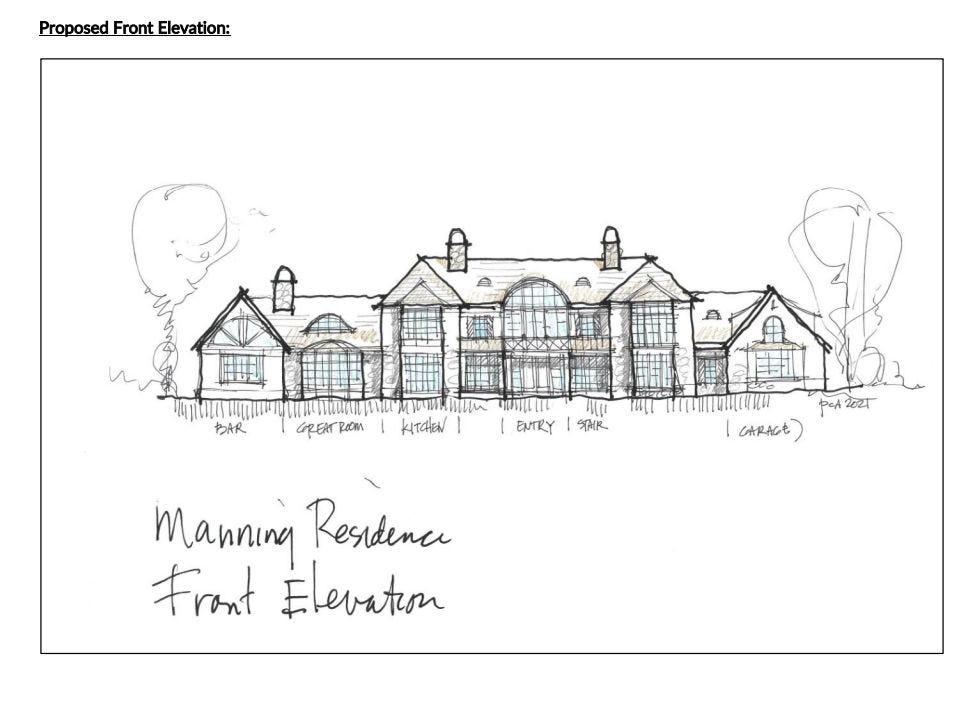
(image)
In other meetings:
- The Albemarle Charlottesville Regional Jail Authority meets virtually at noon. (Zoom link)
- Fluvanna County will hold a Comprehensive Plan open house from 5 p.m. to 7 p.m. in the Fluvanna Public Library. See the flier for more information.
- The Police Civilian Oversight Review Board meets at 6:30 p.m. There’s no agenda available at publication time. (meeting info)
- The Places29 North Community Advisory Committee is scheduled to meet virtually at 6:30 p.m. There’s no agenda available at publication time. Will they get the same type of presentation that the Crozet CAC got on Wednesday? (meeting info)
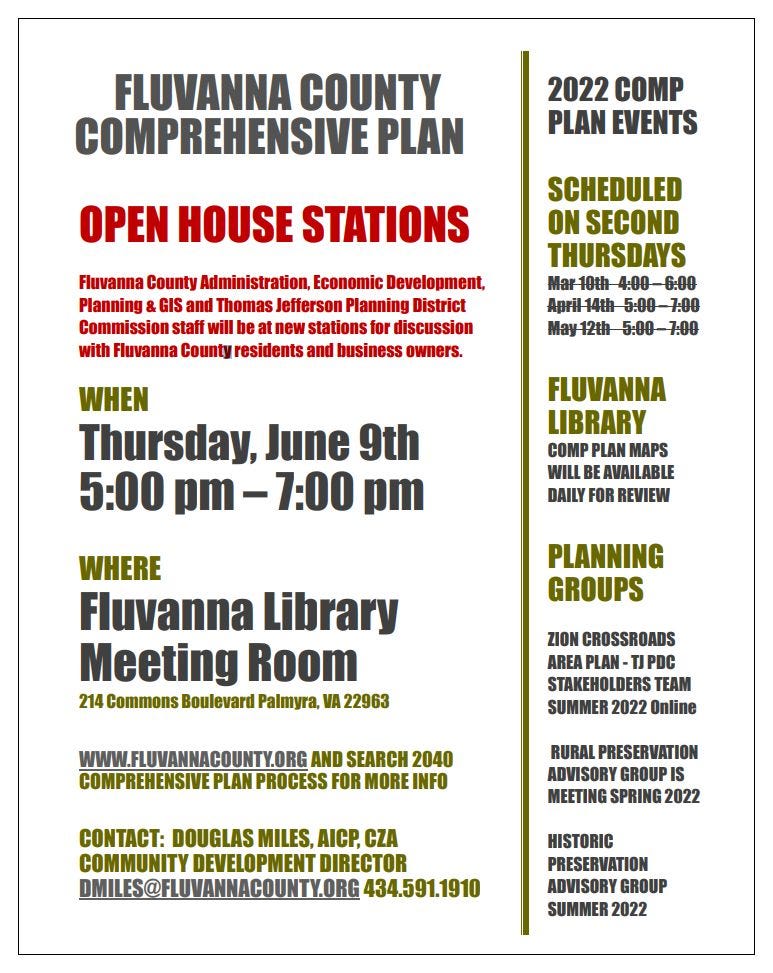
Friday, June 10, 2022
Charlottesville’s Historic Resources Committee is the sole meeting of the day with a virtual event that begins at 11 a.m. On the agenda are the usual items of “Engagement of the Descendant Community for Court Square / Slave Auction Block site” and “Downtown Walking Tour Map Work Session.” (meeting info)
This post was contributed by Sean Tubbs. Sean is a journalist working to build a new information and news outlet centered around Charlottesville and Virginia. In 2020, he launched a daily newscast and newsletter and also created a semi-regular podcast on the pandemic.
Support for Sean’s “Week Ahead” update comes from The Piedmont Environmental Council.
